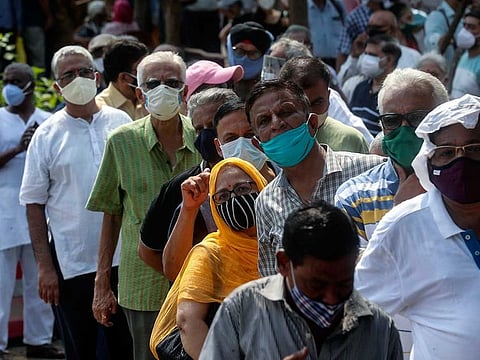India: Karnataka makes face mask mandatory for people above 60 and those with heart, kidney diseases amid COVID scare
India issues advisory to states amid uptick in COVID cases

New Delhi: The southern Indian state of Karnataka has ordered people above 60 years of age, those with heart and kidney diseases, and those with fever, phlegm, and colds to wear masks amid the JN.1 subvariant scare.
The state government has issued an order to this effect on Tuesday following the detection of the JN.1 subvariant of the coronavirus in Kerala.
The Telangana government, meanwhile, alerted all hospitals in the state over JN.1 sub-variant with an advisory.
“JN.1 is a subvariant of Omicron. There were many cases in Kerala. Our state government has issued an alert to all hospitals in the state. If there are any cases of influenza-like illness or severe acute respiratory illness we need to monitor them, increase their testing, keep them in isolation wards, wear masks and keep medication ready,” Dr M Raja Rao, Additional Director of Medical Education (DME) and Superintendent of Gandhi Hospital in Telangana told ANI.
Rao said that the Gandhi Hospital is well-equipped to deal with the new sub-variant of coronavirus and there is no need to worry.
No JN.1 cases
“There are no cases of JN.1 variant in Telangana and usually after the pandemic, we get one or two cases in a week here at Gandhi Hospital. Today no cases were reported. Even if cases of this variant are reported we are ready for treatment whether in terms of beds, medication, or equipment. There is no need to worry,” the Additional DME said.
India’s COVID-19 situation remains under control, with an active caseload of 1,828 as of Monday. However, one death was reported in Kerala, where the JN.1 subvariant of the coronavirus was recently detected. JN.1 was first detected in September 2023 in the United States.
In the wake of the surge in respiratory diseases and the new JN.1 COVID sub-variant, the World Health Organisation (WHO) said that the virus is evolving and changing and urged the member states to continue with strong surveillance and sequence sharing.
The federal government, meanwhile, issued an advisory to the state governments urging them to take adequate precautionary measures.
“Considering the upcoming festive season, there is a need to put in place requisite public health measures and other arrangements to minimize the risk of increase in transmission of the disease by adherence to the maintenance of respiratory hygiene”, read the advisory.
The government further directed the states to monitor the occurrence of respiratory diseases district-wise.
“Ensure monitoring and reporting of district-wise influenza-like illness and severe acute respiratory illness cases in all health facilities on a regular basis including in the Integrated Health Information Platform (IHIP) portal, for detecting the early rising trend of cases”, it said.
The central government further directed the state administration to ensure Covid testing as per the set guidelines.
Under control
“Ensure a higher number of RT-PCR tests and send the positive samples for genome sequencing to the Indian SARS COV-2 Genomics Consortium (INSACOG) laboratories so as to enable timely detection of new variants, if any,” the advisory read further.
“Promote community awareness to seek their continued support in managing COVID-19, including adherence to respiratory hygiene”, it added.
The Union Ministry of Health is in regular touch with the State Department of Health, Kerala and monitors various points of entry.
Earlier on Saturday, ANI reported first about the Covid-19 subvariant JN.1 detected in Kerala, which is a descendant of BA.2.86.The India SARS-CoV-2 Genomics Consortium (INSACOG), a network of genomic laboratories, has been actively monitoring the genomic aspects of COVID-19 in India.JN.1 was first detected in September 2023 in the United States.
The World Health Organisation (WHO) said that the virus is evolving and changing and urged the member states to continue with strong surveillance and sequence sharing.
The global body also shared a video of its COVID-19 technical lead, Maria Van Kerkhove, who explained the reason for the recent surges and what precautions can be taken.
Sign up for the Daily Briefing
Get the latest news and updates straight to your inbox


